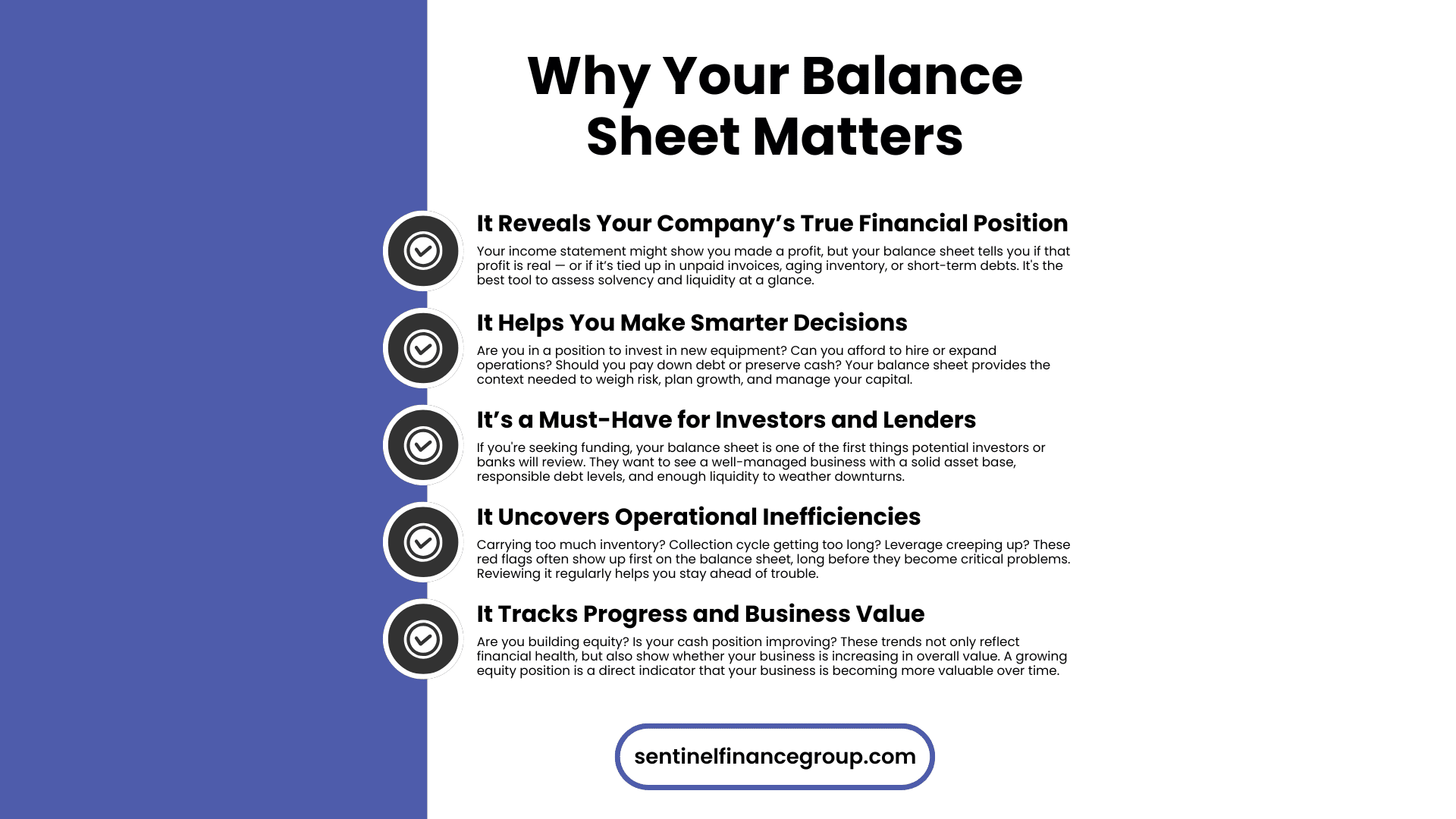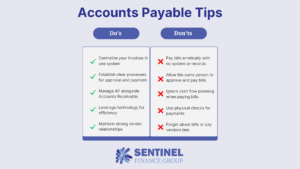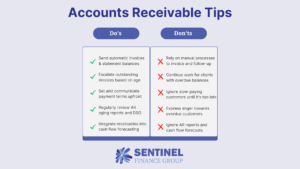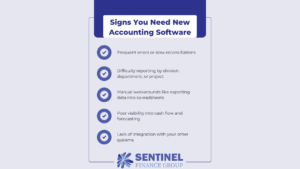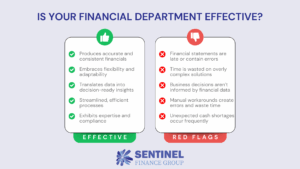The balance sheet is one of the three essential financial statements every business needs — alongside the profit and loss statement (P&L) and the statement of cash flows. Yet, it’s the one most often overlooked by business owners.
Why? Because many business owners focus on the P&L. They want to know: “Are we making money this month?” That focus is understandable — profit matters. But the balance sheet tells a much deeper story: your business’s overall financial health, its long-term sustainability, and ultimately, its value.
In fact, we’d argue the balance sheet is just as important — if not more important — than your P&L.
What a Balance Sheet Really Tells You
At its core, the balance sheet shows what your business owns, owes, and what’s left over:
-
- Assets: Everything the business owns (cash, accounts receivable, inventory, property, equipment, etc.)
-
- Liabilities: Everything the business owes (loans, credit cards, payables, taxes, etc.)
-
- Equity: The net worth of the business (what’s left if you sold all assets and paid off all debts)
Unlike your P&L or cash flow statement, which only reflect a specific period of time, the balance sheet carries forward from the day the business started. It’s a snapshot of your business’s financial position at a single point in time.
Why Your Balance Sheet Matters
1. It Reveals Your Company’s True Financial Position
Your income statement might show you made a profit, but your balance sheet tells you if that profit is real — or if it’s tied up in unpaid invoices, aging inventory, or short-term debts. It’s the best tool to assess solvency and liquidity at a glance.
2. It Helps You Make Smarter Decisions
Are you in a position to invest in new equipment? Can you afford to hire or expand operations? Should you pay down debt or preserve cash? The answers to these questions live in your balance sheet. It provides the context needed to weigh risk, plan growth, and manage your capital.
3. It’s a Must-Have for Investors and Lenders
If you’re seeking funding, your balance sheet is one of the first things potential investors or banks will review. They want to see a well-managed business with a solid asset base, responsible debt levels, and enough liquidity to weather downturns.
4. It Uncovers Operational Inefficiencies
Carrying too much inventory? Collection cycle getting too long? Leverage creeping up? These red flags often show up first on the balance sheet, long before they become critical problems. Reviewing it regularly helps you stay ahead of trouble.
5. It Tracks Progress and Business Value
Comparing balance sheets month-over-month or year-over-year gives you a clear picture of how your business is evolving. Are you building equity? Is your cash position improving? These trends not only reflect financial health, but also show whether your business is increasing in overall value. A growing equity position, for example, is a direct indicator that your business is becoming more valuable over time — something every owner should be tracking.
What to Watch For on a Balance Sheet
There are a few key indicators on a balance sheet that matter most:
-
- Short-term liquidity: Can you cover your short-term liabilities with your short-term assets? This is a direct measure of financial stability.
-
- Equity: This is an indication of what your business is actually worth — and how much value you’ve built over time.
-
- Cash position: How much accessible cash do you have to run your operations or manage through slow periods?
-
- Long-term debt vs. assets: Are you growing sustainably or carrying too much debt?
The balance sheet also tells you how much you’ve paid out to investors, how much you’ve reinvested into the business, and whether your growth is actually healthy — or just high revenue covering high risk.
The Risks of a Neglected Balance Sheet
Unfortunately, many business owners don’t regularly review their balance sheets — or they rely on inaccurate or outdated data.
Here’s what can go wrong:
-
- Misrepresented financials that hurt your chances of securing a loan, investment, or grant
-
- Bad internal decisions based on faulty assumptions about cash, debt, or value
-
- Potential legal or compliance issues if you submit incorrect financials to outside parties
The longer a balance sheet is left unchecked, the more complex (and expensive) it can be to clean up.
But here’s the good news: you don’t always need a complete rebuild. With the right financial expertise, there are practical ways to clean up and clarify your balance sheet without going down an overly complicated or costly path.
How Sentinel Finance Group Can Help
At Sentinel Finance Group, we review your balance sheet for accuracy and clarity — and then go a step further.
We help you:
-
- Understand what your numbers are really telling you
-
- Clean up inaccuracies and neglected accounts
-
- Use your balance sheet as a foundation for smarter reporting and strategy
-
- Present accurate, compelling financials to lenders, investors, or other stakeholders
Whether you’re scaling, fundraising, or just trying to run your business more confidently, your balance sheet shouldn’t be ignored.
Need a second set of eyes on your balance sheet?
Let’s schedule a review. Sentinel Finance Group is here to help you take control of your numbers — and your future.
Sentinel Finance Group is a fractional CFO firm in Kansas City and provides CFO services and controller services to local businesses.
